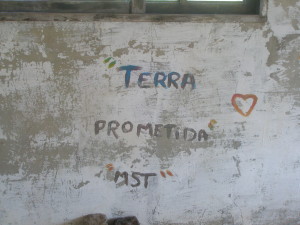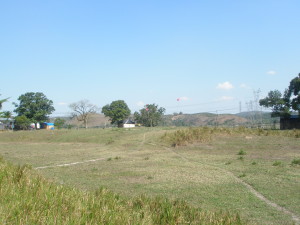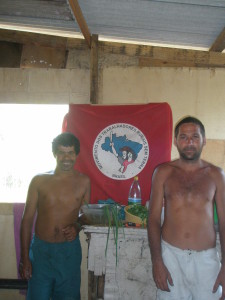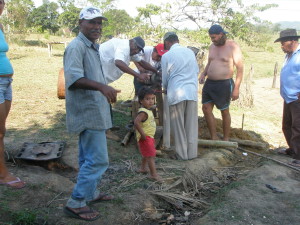Jeremy Lester
The human river that flowed along the asphalt through the night, discharging at the gate of the plantation, stops and backs up like the waters of a weir. The women and children are quickly sent to the rear of the ‘dam’, while the men take positions at the front of the imaginary line to prepare for the possible confrontation with the plantation’s jagunços.
With no reaction from the latifundio’s small army, the men in the vanguard break the padlock and the gate opens wide. They enter. Behind them, the human river begins to move. Scythes, hoes and banners are raised in the unrestrained avalanche of hope in this re-encounter with life – and the repressed shout of the landless sounds as one voice in the brightness of the new day…
Sebastião Salgado
La Terra Prometida (The Promised Land). Oh, how many times has this name been solemnly and proudly pronounced only to be found inexistent in reality; nothing more than a dream or a well-named utopian ‘no place’. Yet occasionally, just occasionally, dream and reality do coincide. This is the case here, or so it seems to me. To be sure this is no land of Kenites, Kadmonites, Hittites, Rephaites, Amorites and Jebusites. If this really is a New Jerusalem, it is as far distant from the old one as one can possibly imagine. Yet as one looks at the land that stretches out before us, one realises just why the two Old Testament books of Genesis and Exodus are invoked so frequently even here. The space before us seems not only endless, but remains for the most part untouched by human hands and human toil. It is a virgin space if ever there was one, a space of eternal genesis, of constant becoming, or, to use the terminology of Alain Badiou, an ‘event site’, a ‘point of exile where it is always possible that something might [and will] happen.’[1]
Where, you might ask, am I? Well, I am in the still largely barren rural landscape that continues to dominate much of the peripheral borders of the state of Rio de Janeiro in Brazil, and the purpose of the visit is to lend a hand in being a midwife to a ‘birth’. As you might gather, this is no ordinary birth. What has been conceived here is a new ‘occupation’, and the proud parents of this birth are the local activists of the Movimento dos Trabalhadores Rurais Sem Terra (MST); a movement that during the course of its thirty year existence has increasingly come to be recognised, and rightly hailed, as not just one of the largest, but also one of the most astute, modern, dynamic, moral, integral and ambitious social movements anywhere in the world today. Such eulogies, I can assure you, are not misplaced and stem directly from its actual record of achievement. As a direct result of its land occupation strategies – in a country renowned of course for having one of the most unjust, unequal land distribution systems in the world[2] – it has helped to settle hundreds of thousands of families across more than eight million hectares of formerly unproductive land. Not only that. With a membership not far short of two million people and with a strong presence in all but three regional states and in several hundred municipalities, it also runs several hundred production, commercialisation, and services associations, many of which are organised into collective and semi-collective production cooperatives. It carries out all of its own training activities and it administers no less than two thousand schools, in which several thousand students teach basic literacy to 50,000 children, teenagers and adults. It also has its own university and partnerships with fifty-nine other universities throughout the country, and has won much recognition, as well as awards, from UNESCO and UNICEF for all its educational activities. In the areas under its control, it has virtually eliminated child mortality (which is certainly not the case elsewhere in the country), and has won much acclaim for many of its other community policies, particularly in the sphere of culture.
What lies before me, then, is a landscape waiting to be formed out of vacant space; a becoming landscape in the creative distance of space-time. I say waiting to be formed, but ‘carved’ would be a more appropriate term. For isn’t this what peasants are: sculptors of time, sculptors of earth, modelling a realm of culture out of nature? And isn’t an occupation of this kind like a work of art; one whose task is not to reproduce what is visible, but to make things visible?
The occupation itself, fortunately, had gone very smoothly, and already there were the usual signs and images that accompany an encampment in this very early stage of its development: the hastily constructed shacks (lonas pretas) with their black plastic protective covering, the endless hustle and bustle, toing and froing, and of course the rippling red flag marking its entrance, emitting a glow as if it were a ‘great bonfire, announcing that [here] the slaves seek freedom and inviting others like them to forge together their own destiny.’[3] If the scene in front of me could be painted, it would take, I think, a Bruegel – that ‘Shakespeare of popular life’[4] – to do it full justice. Both the landscape and the people in it lend themselves naturally to someone of his talent, ability and wit. Above all, no one more than he would best be able to capture the image of these people as they truly are in themselves. And do not get me wrong. I am not implying that there is a large degree of naivety and innocence here; far from it. But there is a simplicity about the scene which is certainly not equivalent to innocence. In one corner of the ‘canvas’, illuminated by the early morning sun, there is a man sitting on the ground sharpening and preparing the tools that he needs for the forthcoming day’s labour, with such a smile on his face that he looks fit to burst with joy. In another corner, there are the men grooming the horses in preparation for their own exertions of the day. Nearby, there are women hanging out washing on a makeshift line. While elsewhere, in a scene wonderfully reminiscent of Bruegel’s ‘Children’s Games’, the young boys and girls of the encampment are busy in their own activities, no doubt dreaming of the day when the little school will be ready for them, whose terrain has already been chosen and marked out. And what I would want my Bruegel to do more than anything is to capture all of their jovial, roguish, animated faces and expressions, as only he could do with such economy and flare, in strong colours and bold compositions, so as to lend the scene all of the epic humanity – and indeed the frailty of it as well – that it so deserves.
But the most prominent part of this ‘canvas’ must be reserved for another scene altogether, a Bruegelesque ‘allegory of hope’ if ever there was one. There before us is a small group of people who have been working away since the crack of dawn on the most important task of all. A spring has been located and by the end of the day a makeshift pump needs to be constructed so as to give the occupants of the encampment a ready supply of ‘blue gold’ close to their new homes. It is this scene that will shape the destiny of the lives of these people for as long as they live. And it is not a vain destiny of fleeting images, but an essential destiny that will endlessly change the substance of being.[5] As W.H.Auden so aptly put it: ‘Thousands have lived without love, not one without water.’[6]
Everything commences with water. All things are flowing. How right the ancient sages were. It is by means of water that we measure time and structure space. And is it any wonder that there were so many cults of water in ancient times, many of which remain alive today. It is the source of everything in life. It is in itself, in its very essence, the closest thing to a ‘god’ as one can possibly get. Is it not for this reason that it is the bearer of life and of hope; the hope of something to come?
Every space, meanwhile, has its own ingrained form of resistance. Every occupation of space must find ways of overcoming this resistance. But for the occupation to succeed, there must also be a communication with that space. The construction of the pump represents precisely this. It is a ‘communicating vessel’ with the land, which literally plumbs the depth of primitive and eternal being, as well as the wellspring of the deepest emotions possible. And what emotions are on display in this immanent space. You can see the anticipation in their eyes. You can see their thoughts taking shape and their dreams carrying them off down the flowing streams of consciousness. And being immanent, it is a space that is ‘actualised at every moment in terms of the whole of one’s “affections” (which are nonetheless in constant variation).’[7]
The time of waiting is a fertile time, especially here where time seems to languish, affording one the luxury of time (and space) to contemplate, to create; magic time fending off the conquistadors of ordinary, insipid time.[8] As the men labour away to create the simple pumping mechanism that will connect the virgin spring to the virgin community, it is inevitably the material consequences of having a permanent water supply that initially dominates everyone’s thoughts. Our perspective, in other words, remains grounded in relation to the earth. But as the day wears on, a strange sensation starts to take hold. The imagination begins to dominate matter entirely, and the seemingly ordinary (sic) event that we are witnessing moulds us as visionaries. As a consequence, the waiting is gradually transformed, metamorphosed. It is now as though we are waiting for the arrival of someone after a long peregrination, a long adventure. And by the early hours of the evening, when the work is finally completed, the transformation of our thoughts and reflections is absolutely profound.
As the handle is turned, the waiting seems endless. Time itself has been eclipsed. When, at long last, the first drop appears and seems to hang there in elastic suspension, trembling, clinging to the end of the pipe before the inevitable descent, it is not so much joy, but a strange sort of primitive sadness and melancholy that grips me. Sadness, because one can sense what sacrifice is being made here by the water; one can feel a sense of loss. Melancholy, because it is the destiny of all water to suffer the most acute form of homesickness. Once it leaves its source, it will never be able to return. It is a permanent emigrant. The pain of water, it is often said, is infinite, for all living water is on the point of dying. Indeed, not for nothing is water often traditionally viewed as a sort of confine, a limen, between life and death.[9] And yet for all this, the sadness and the melancholy are not oppressive. They rest lightly on the mind, because one also feels that the sacrifice is voluntary. If in the ‘eye of the water’ one can detect a tear, it is not necessarily a tear of anguish, but perhaps also of contentment, satisfaction, liberation.[10] For let’s not forget that water is also permanently young. It never grows old.
As the first drop turns into a slight trickle it takes on the form of a hand reaching out to embrace the earth. When the trickle turns into a slow but steady flow, the embrace is transformed into a dance. And then, finally, when the flow is transformed into a veritable gushing forth of water, it is like a beautiful voice singing a cool, liquid melody in radiant harmony. It is a playful voice, more playful than even Ravel or Liszt could ever imagine; one that smiles as it sings, one that echoes our own inextinguishable thirst for life.[11]
And so the bonding between water and earth is complete and the reproductive cycle can commence. From the downward flow of water from Mother Nature’s breast, new life can surge upwards. But just as importantly the land, as it had once been, has likewise been purified, and through its purification it has become truly liberated. Newly cleansed and refreshed, the energy of youth has been returned to it. Not only did we all drink the water in celebration, we kissed it. And as we did so, it was like looking into a mirror of our soul.
Fresh water awakens and gives youth to one’s face, that place where a man sees himself growing old and where he would like to keep others from seeing him age! But fresh water does not rejuvenate our faces for others so much as for ourselves. Beneath the awakened brow gleams a new eye. Fresh water puts fire back in the eye. There lies the principle of inversion that explains the true freshness of the contemplation of water. It is our outlook that is refreshed.[12]
As the light of the approaching evening is filtered not just through the sight of water flowing, but its sound as well, the two senses become united into a single perception. Our sense of smell is also altered as water and night unite their gentleness. ‘For a soul at peace with itself, water and night together seem to take on a common fragrance; it seems that the humid shadow has a perfume of double freshness. Only at night can we smell the perfumes of water clearly. The sun has too much odor for sunlit water to give us its own.’[13]
Was it just my imagination or did everything already look greener, more fertile? And what liquid quality was now given to our speech? No doubt it was the effect of the celebratory eau-de-vie – the marriage of water and fire – for we were now back in the domain of Bruegel: in the Land of Cockaigne.
__________
*I would like to express my sincere thanks to the journal ViceVersa. It was after seeing their very interesting documentary, Ô Saint-Laurent: une histoire d’eau et d’appartenance, that I was moved to send them this contribution on the theme of water and its primary public role in all our lives. When treated with the proper respect not only does water serve our human needs of basic survival, but it can also actively respond to our call for human dignity, community and solidarity.
Água de Rebelião (Rebellion Water) is the title given to a collection of poetry by Hamilton Pereira (Petrópolis: Vozes, 1983).
NOTES
[1] For a very good overview of Badiou’s ideas, see Peter Hallward, ‘Order and Event: On Badiou’s Logics of Worlds’, New Left Review, 53, 2008, pp. 97-122.
[2] According to official statistics, the landmass of Brazil is 850 million hectares, of which half is considered cultivable. However, in practice, only 60 million hectares have thus far been exploited for agricultural production. In terms of ownership structures, meanwhile, 1.6 per cent of private landowners possess 46.78 per cent of the land.
[3] See Ademar Bogo, ‘The Culture of the Sem Terra’, http://www.landless-voices.org, p.4.
[4] This description of Bruegel is by Max Dvorak. See also his History of Art as the History of Ideas (London: Routledge and Kegan Paul, 1984).
[5] See Gaston Bachelard, Water and Dreams. An Essay on the Imagination of Matter, trans. Edith R. Farrell (Dallas: Pegasus Foundation, 1983), p. 6.
[6] W.H. Auden, ‘First Things First’ (1957) in Edward Mendelson (ed), W.H. Auden: Collected Poems (London: Faber and Faber, 1976), p. 445.
[7] D.M. Smith, ‘Deleuze and Derrida, Immanence and Transcendence: Two Directions in Recent French Thought’, in P. Patton and J. Proteri (eds), Between Deleuze and Derrida (London: Continuum, 2003), p. 62.
[8] For more on the peasant conception of time see Michel Onfray, Les Formes du temps. Théorie du sauternes (Paris: Mollat, 2009).
[9] See Vito Teti (ed), Storia dell’acqua. Mondi materiali e universi simbolici (Roma: Donzelli, 2003), p. 24.
[10] There is a spring in the desert that the Tuaregs call ‘the eye of the water’ (shet-n-aman).
[11] Ravel and Liszt are arguably the two classical composers most inspired by the element of water.
[12] Bachelard, Water and Dreams, p. 145. Underpinning these reflections is the manner in which water, and especially springs, ‘is an irresistible birth, a continuous birth. The unconscious that loves such great images is forever marked by them. They call forth endless rêveries… impregnated with mythology.’ (Ibid, pp. 13-14). If I am influenced predominantly by Bachelard here I make no apologies at all. For one thing, he is the most peasant-like of philosophers. And for another thing of all the places where his works have made such an impact outside of France, Brazil is second to none.
[13] Ibid, p. 104.





